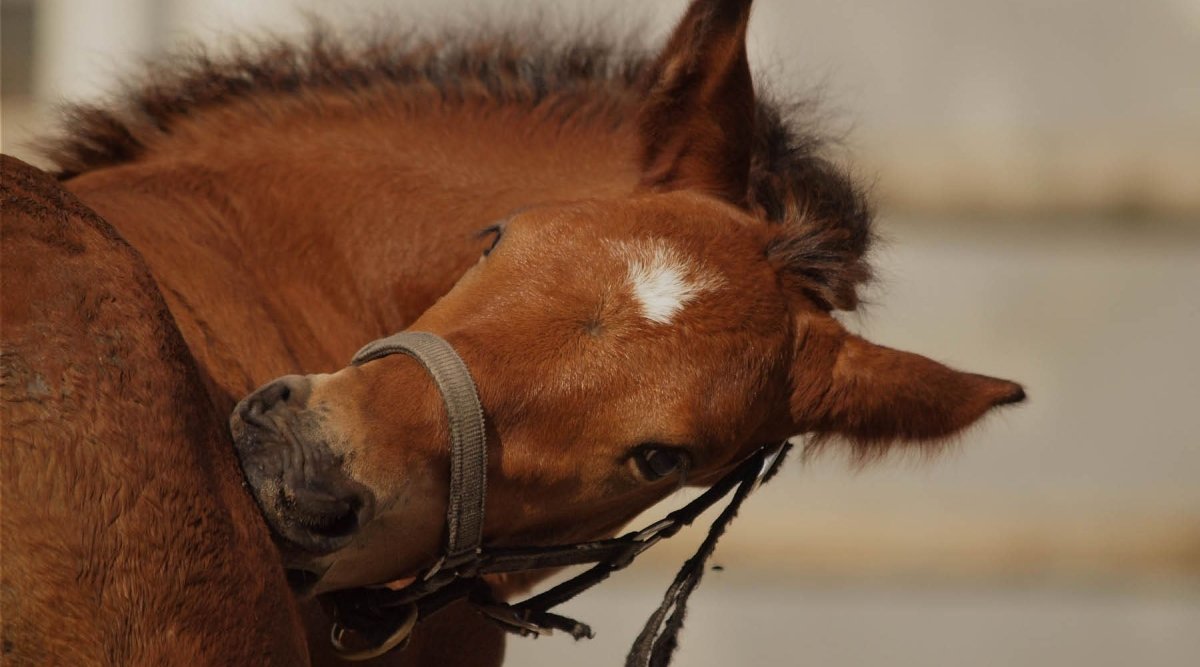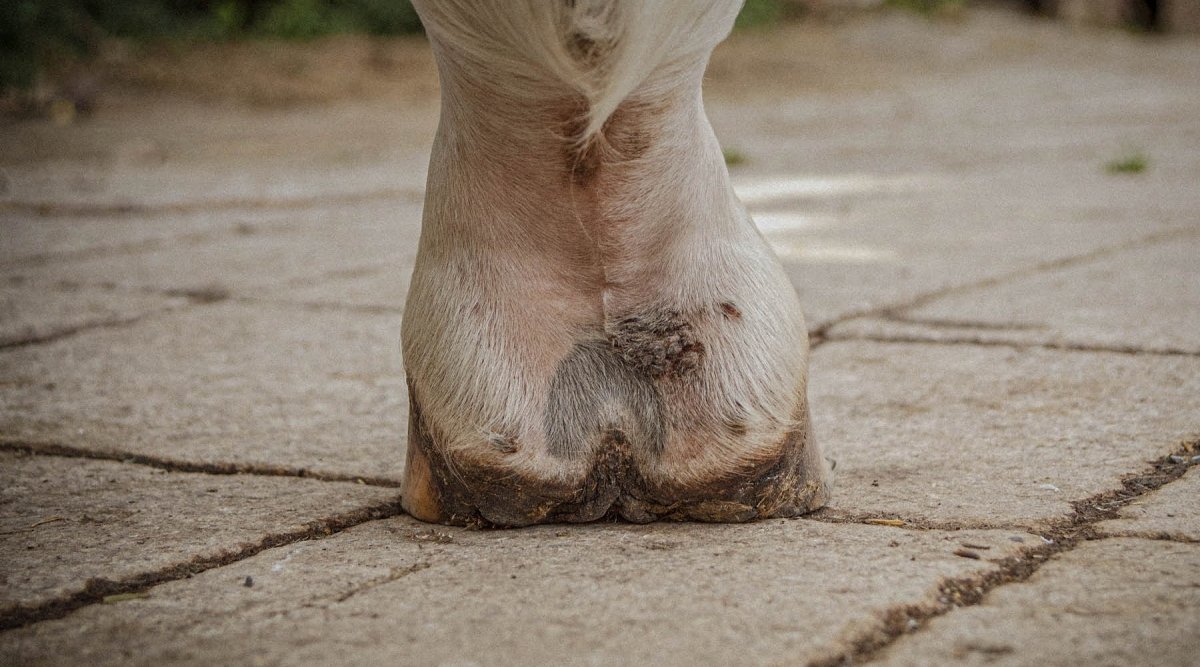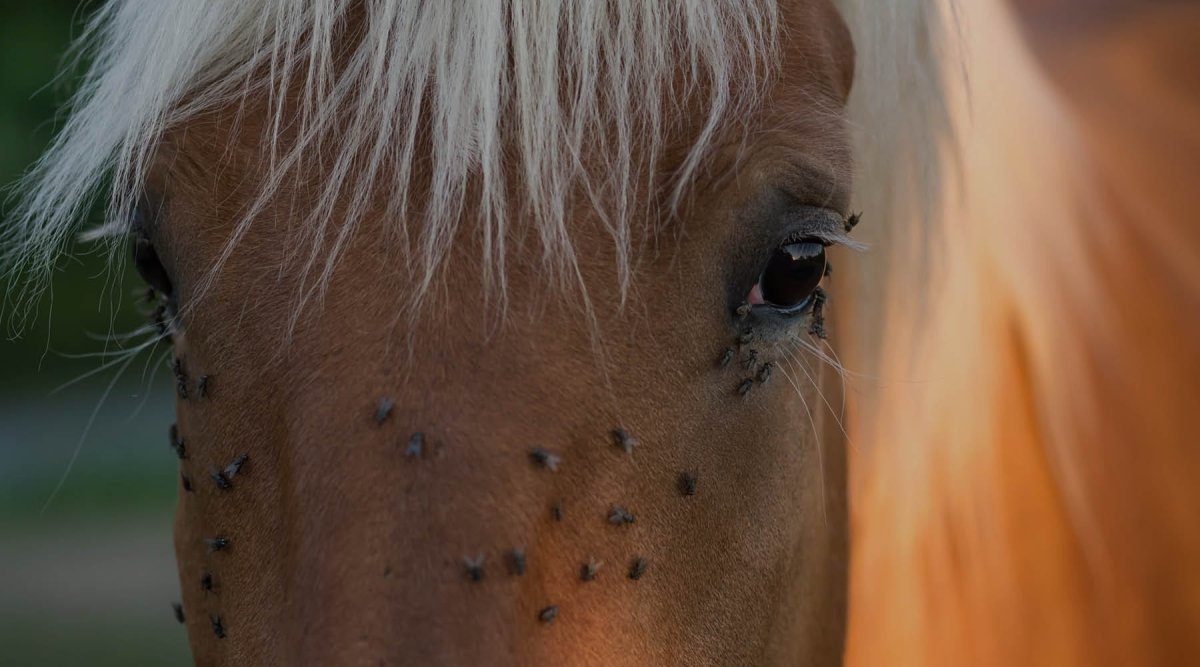Summer eczema in horses causes many horse owners to gasp. But that doesn't have to be the case. There are numerous ways to alleviate your horse's suffering and protect him from severe sweet itch.
Sweet itch - what is it?
Sweet itch is an allergic reaction to the bite of insects, primarily of the gnat and blackfly genus. The insects transmit certain proteins through the bite, which trigger an allergic reaction in some horses, also known as hypersensitivity to insect bites.
The horse's immune system is challenged and produces excessive amounts of histamine, which promotes inflammation and causes the skin to swell. This leads to itching in affected horses, causing the animals to start rubbing and scratching themselves. Unfortunately, the animals can injure themselves severely, not only damaging the first layer of skin but also the deeper tissue. Some horses even chafe themselves to such an extent that their bones and spine are affected.
The older the horse, the more susceptible
The sensitivity of the animals also increases with age. The older horses with eczema become, the more susceptible they are. These horses are bitten and stung by a wide variety of insects. Horses with a weak immune system are particularly susceptible, as are animals that have few or no midges or black flies in their environment. They have not been able to build up sufficient defenses against the bites of these insects.
As a rule, the tail and mane crest are affected first. Over the years, the eczema can spread to the back, lower abdomen and face. Hairless patches, dandruff and sores, bloody crusts are all signs of sweet itch in horses.
The period of sweet itch in horses begins in April and lasts until October.
What helps with sweet itch in horses?
It's quite clear: the more insects, especially midges and black flies, that bite horses, the more severe the eczema and the suffering of the animals. You should therefore protect your eczema horse from possible insect bites and stings.
Eczema blankets
Eczema blankets are very effective in keeping annoying insects away from your horse. However, make sure that the material is robust and strong. The blankets should also cover the horse's entire upper body: back, neck, underbelly, head and ears.

Insect repellent sprays for prevention
Insect repellent sprays are another way of preventing insect bites on horses. A spray against flies and other parasites based on essential oils is recommended. These oils have an intense odor and make the animal unattractive to many parasites. Also remember to adapt the stable care against insects to protect your pet from the pests in the stalls.
Tip: Test the spray with a few sprays on your eczema horse first. Sensitive animals also tend to overreact to essential oils.
Nutrients for the horse's skin and coat
If horses suffer from severe skin conditions, their nutrient intake should be adjusted. However, do not resort to random vitamin supplements, as this could have exactly the opposite effect. Pay attention to selected natural nutrients that are particularly relevant for the skin and coat metabolism. It is best to have a blood count carried out by a vet or veterinary practitioner so that you can work specifically against nutrient deficiencies.
Important nutrients for healthy skin and a shiny coat:
Zinc - Is essential for cell growth and cell renewal. The mineral is a component of the skeleton, enzymes, collagen synthesis and antibody formation.
Biotin - Is considered THE vitamin for healthy skin and shiny hair. It also has an essential influence on horses' hooves. Although animals can produce biotin themselves via the large intestine flora, their own synthesis can be inhibited by many factors such as medication, stress, illness and, of course, a disturbed gastrointestinal tract.
Omega-3 fatty acidsare among the healthy fats and are essential for the cell membrane. Horses should be regularly supplied with omega-3 fatty acids. Linseed oil and salmon oil are proven sources and help to balance the horse's omega-3 balance.
Selenium - A trace element that is vital but only needed in small amounts. Selenium protects the cell membrane from oxidative stress and is found in numerous enzymes. In combination with vitamin E, it has an immunomodulating effect and therefore supports the body's defenses.
A trace element deficiency is one of the most common factors influencing severe summer eczema. Added to this are a lack of exercise and a general oversupply of nutrients from concentrated feed. If the protein oversupply is reduced and the lack of trace elements is compensated for, your horse has a good chance of minimizing the degree of disease.
Grazing at night
Insects are less active at night than during the day. Temperatures also cool down considerably at night, which means that the animals sweat less. If you can arrange it, try to let your animal graze in the pasture at night.
When choosing a pasture, however, make sure it is far away from lakes or moors. Midges and black flies feel very comfortable near water and can be found there in large numbers.
Protect the stable properly
Animals should be protected from annoying midges not only outside on the pasture but also in the stable. Fly screens and long strip curtains on the windows and doors can also effectively keep the parasites out of the stable.
Relieving sweet itch in horses
Does your horse already have clear summer eczema and is it scratching and rubbing? Then you should urgently alleviate his suffering so that no secondary infections can develop.
- Relieve itching - In acute cases, the first priority is to relieve the itching. You can soothe the irritated skin with a > mild skin care product. Horse owners have repeatedly reported that fresh honey from the beekeeper mixed with a little rapeseed oil can be applied to the sore areas and the sores are significantly soothed after a few days.
- Minimize stress - summer eczema can cause severe stress in horses, making the animals very sensitive to insects and mentally challenging. We recommend offering the animal opportunities to retreat away from other animals and possibly reducing participation in competitions.
- Autohemotherapy and desensitization - Autohemotherapy for desensitization has proven effective in combating the horse's allergic reaction. If you would like to find out more about this, you should speak to your trusted vet or veterinary practitioner about whether it is an option for your horse.
- Corticoids ("cortisone"), antibiotics or antihistamines - sometimes there is no other way. If your animal has severe sweet itch, so that even secondary infections are clearly visible, then unfortunately there is no way around conventional medicine. The inflammation in your horse's body must be combated to prevent the bacteria from causing even more damage. However, you should not resort to chemicals at the first sign of sweet itch, even if they are sometimes essential. Try natural home remedies first.
- Strengthen the immune system - The immune system is the most important barrier against viruses and bacteria. If it is intact, horses generally have little or no problems with allergies and eczema. If an animal is severely allergic, an immune boost should always be considered. In addition, the metabolism should be activated and detoxification carried out several times a year. Nettles are suitable for purifying and detoxifying. The effect of this ancient medicinal herb has been known for generations. Nettles support diuretic and detoxifying processes in horses and promote kidney function.





